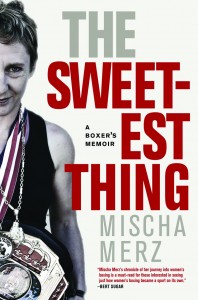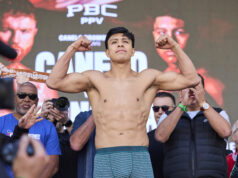
There are prizefights that begin with one participant looking so confident and establishing such a superiority of craft that you wonder if this mightn’t be a genuinely unique experience in the presence of a genuinely unique talent. But then, with a comfortable lead built, the participant takes a middle round off before ultimately showing skill enough to earn a decision victory.
“The Sweetest Thing” by Mischa Merz (Seven Stories Press; $18.95) is a book very much like that sort of prizefight.
Merz, an Australian journalist and masters-division amateur champion, has no want of talent. The book’s opening pages include a wealth of well-shaped insights like this description of the women’s dressing room at Gleason’s Gym in New York City:
“. . . boxing boots stuffed in every spare bit of space, a mirror and bench designed for makeup application, pink bandanas drying off along with hand wraps, and exfoliating sponges and bottles of conditioner jostling for space. It was an object lesson in the human capacity to absorb many conflicting ideas into a complex identity . . .”
“The Sweetest Thing” introduces the sport of boxing in such a joyful first-person voice that a reader sympathizes immediately with the narrator. You do not start by cheering for Merz to trounce a rival so much as find a fight. She has traveled from the other side of the world, combed YouTube.com for footage of opponents, and put herself through the rigors of a training camp. You hope someone grants her the test she seeks.
This is a book about women’s boxing and its search for respectability, but it is not a book of sermons. For being a double outsider – an Australian woman in American boxing – Merz has an uncommon perspective. And her observations about fighting are first rate.
“People assume that pain is what a fighter fears most,” Merz writes. “But actually it isn’t. Pain is familiar and tolerable. Humiliation lurks like a hidden phantom, it can tower over you, it is mysterious and confusing. Very few fighters are willing to sacrifice their trademark style for victory.”
That is a fantastic series of sentences. It explains a great deal about why, despite fans’ and commentators’ urgings, fighters rarely toss caution windward and rush crazily at even light-hitting opponents. It is a sensation anyone who has sparred knows well; you are more willing to take abuse from a sparring partner in an empty gym than a crowded one, which sets the hands on the clock of your true fear – humiliation, not pain.
One page later Merz provides even better writing about the experience of being hit in the face, one that nature prepares none of us for. And in the next chapter – aptly named “Big Hat, No Cattle” – Merz expands on the nature of her own discomfort:
“The turmoil within comprised a potent mix of distress, humiliation, and many different and disorienting facets of existential pain, but no actual physical pain.”
All odes to the writer’s eye aside, there is no alternative path to that insight. You do not write a sentence that good unless you’ve donned headgear and sparring gloves and been struck in the face by someone who knows how.
A little bit before the halfway point of “The Sweetest Thing,” Merz’s fistic adventuring brings her to a boxer worthy of a quick detour. Melissa Roberts, a USMC boxer from New York, is a special combination of talent, ferocity, arrogance and charm.
Merz knows this in part because of renowned trainer and former world champion Anne Wolf’s familiarity with Roberts. Here’s something Merz and Wolf might not know about Roberts (though one suspects they do): In February, Roberts, now known as Melissa Parker, made one of the finest four-round fights, professional or amateur, seen in years.
Fighting in the Regional Golden Gloves tournament held at San Antonio’s Municipal Auditorium, Parker boxed a hellacious 12 minutes with 132-pound local favorite Selina Barrios, beating Barrios by a score of 3-2. The decision was disagreeable to Texans in attendance. But afterwards, Parker was friendly and confident as could be the right woman had won.
Merz’s own championship victory in a Ringside tournament, surprisingly, leads to her book’s least-pleasant chapter, a regrettable 27-page departure from the likable character found in the other 255 pages. Merz trains her prose on a transsexual competitor once named Paul but now calling herself Pauline. Merz comments relentlessly on Pauline’s oddity. As a reader, you play along, anticipating an amiable conclusion to the anecdotes. But there isn’t one. Pauline is a curiosity for curiosity’s sake, a freak, in other words, whose purpose is to illustrate boxing’s eccentricity of characters.
You suddenly stop cheering for Merz. You stop overlooking mishaps like reporting that dogs called Camacho and Hagler “were named after the two greatest welterweights of the modern era.” Or numerous references to the Wild Card Gym’s “Freddy Roach.” And you begin to wonder about the origin of Merz’s mean-spirited fixation on American obesity.
Fortunately, one chapter later, a very interesting treatment of training alongside former world champion Lucia Rijker, Merz is back in form. She returns to being a participant journalist, a narrator who won your loyalty with such descriptive gems as “spank of gloves on bags,” “affirmative action overstatement,” “compelling androgyny,” and “bland microclimate.”
The book ends on a well-written if dubious note, chronicling the unprofessionalism of a Gleason’s Gym fighter named Melissa Hernandez. After weeks of buildup and silly trashtalk Hernandez refuses to fight in a main event because she is not present to see an opponent’s hands wrapped. When some predictable palliation comes from Hernandez’s camp, Merz does her profession a service by gently ridiculing it.
“The Sweetest Thing” is an enjoyable read, finally. It is a book that will please anyone, male or female, who has become a fighter or wondered what it would be like to try.
Bart Barry can be reached via Twitter.com @bartbarry







